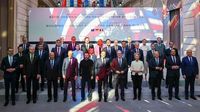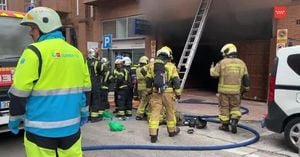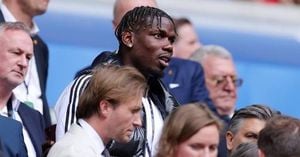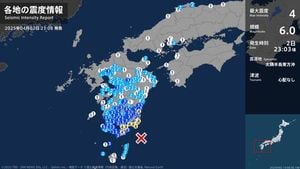In a significant diplomatic effort, European leaders are rallying to form a "Coalition of the Willing" aimed at securing a lasting peace deal to end Russia's ongoing war against Ukraine. This coalition, spearheaded by UK Prime Minister Keir Starmer and French President Emmanuel Macron, is intended to bolster Ukraine's defenses and ensure its sovereignty amidst an increasingly volatile geopolitical landscape.
The urgency for this coalition intensified following a surprising 90-minute phone call on February 12, 2025, between former US President Donald Trump and Russian President Vladimir Putin, during which Trump initiated negotiations with Putin without consulting European allies. This unilateral move left European leaders scrambling to reassert their influence and protect their interests in the conflict.
Starmer emphasized the need for unity in Europe, stating, "Europe, as a whole, has not been this strong and united for a very long time." The coalition's primary goal is to support Ukraine in achieving a peace deal that is both solid and enduring. Macron echoed this sentiment during a leaders' summit in Paris, declaring, "Our goal is clear: to secure peace. To do this, we must put Ukraine in the best possible position to negotiate and ensure that the peace that is negotiated is solid and lasting for Ukrainians and all Europeans."
The seeds of the coalition were sown on February 17, 2025, when Macron convened a meeting of select leaders to discuss a coordinated response to the evolving situation. Just weeks later, on March 2, Starmer hosted a broader meeting in London, officially announcing the formation of the coalition. The Paris summit that followed expanded participation, bringing together leaders from over 30 countries, including Turkey, Australia, and Canada, represented by their ambassadors.
However, not all European nations are on board with the coalition's objectives. Malta and Austria have opted out due to their neutrality, while Hungary and Slovakia have refrained from joining due to disagreements over military assistance to Ukraine. In contrast, Ireland participated actively, with Taoiseach Micheál Martin stating, "We're willing to do whatever we possibly can to help."
At the heart of the coalition's strategy are three primary areas of focus. Firstly, it aims to provide continued support for Ukraine's armed forces, which is deemed essential for deterring further Russian aggression. European nations have already pledged additional military donations, including artillery, air defense systems, missiles, and drones.
Secondly, the coalition is working to establish a reassurance force that could be deployed on Ukrainian soil. Macron clarified that this force would not act as a peacekeeping mission but would instead serve as a deterrent against Russian advances, positioned strategically in key locations like cities and power plants. Starmer noted, "This is a force designed to deter (and) send a message to Putin that this is a deal that is going to be defended."
Lastly, the coalition is focused on enhancing Europe's own defense capabilities, with the European Commission proposing to mobilize up to €800 billion in fresh investments for defense initiatives, which Ukraine is expected to benefit from.
Despite the growing consensus on the need for a robust response, the question of troop commitments remains contentious. Currently, only France and the UK have officially pledged to contribute soldiers to the reassurance force. Other nations, such as Sweden, Denmark, and Australia, have expressed willingness to consider sending troops, while Poland and Greece have opted out due to regional security concerns.
As the coalition moves forward, it has become clear that the involvement of the United States is crucial. Although the US is not a formal member of the coalition, Starmer has indicated that US support will be vital for the coalition's success. He stated, "As I've always said, this will require the engagement and support of the United States." The ongoing discussions between European leaders and Trump aim to ensure that US military backing, such as air protection and intelligence sharing, will be available to bolster the coalition's efforts.
In parallel to the coalition's formation, tensions continue to escalate between Ukraine and Russia. On April 1, both nations lodged complaints with the United States regarding violations of a tentative agreement to refrain from striking each other's energy sites. Ukrainian President Volodymyr Zelensky has called on Washington to impose stricter sanctions on Russia, claiming that Moscow is not adhering to commitments made during recent negotiations.
Zelensky stated, "I believe we have come to the point of increasing the sanctions impact, because I believe that the Russians are violating what they have promised America." He also reiterated Ukraine's readiness for an unconditional ceasefire with Russia, highlighting the need for a diplomatic resolution.
In Moscow, President Putin addressed allegations of Ukrainian violations during a meeting with top security officials and confirmed that Russia had submitted its complaints to US officials. Foreign Minister Sergei Lavrov indicated that they provided a list of alleged violations to US National Security Advisor Mike Waltz and Secretary of State Marco Rubio.
As the situation develops, both Ukraine and Russia remain locked in a cycle of accusations and counter-accusations, complicating the prospects for peace. Ukraine's Foreign Minister Andriy Sybiga noted that fresh talks are underway between Kyiv and Washington regarding a minerals agreement that would facilitate US access to Ukrainian natural resources in exchange for increased support.
Looking ahead, the coalition's defense ministers are scheduled to meet on April 10, 2025, in Brussels to discuss the next steps in their efforts to secure a lasting peace for Ukraine and counter Russian aggression. The outcomes of these discussions could shape the future of European security and the ongoing conflict in Ukraine.




